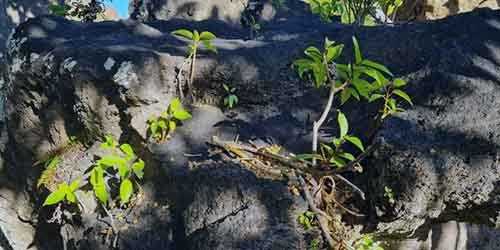The NEPP (Nature and Environment Policy Plan) team, in collaboration with key stakeholders, has made significant strides in reducing erosion and promoting vegetation recovery on Saba. Notable progress is visible in areas like Giles Quarter, where tree saplings are now successfully emerging. Historically, overgrazing by free-roaming livestock, particularly goats, prevented young trees from developing. With these saplings now thriving, they play a crucial role in stabilizing soil, preventing landslides, and preparing the island for the impacts of climate change. It is vital to protect these young trees so they can mature and become part of Saba’s forests. Similar improvements are evident in the spread of grasses and shrubs across the island’s hillsides.

Photo PES
The regrowth of vegetation is expected to reduce rockfalls and landslides, enhancing safety for residents, infrastructure, and marine ecosystems. Erosion, worsened by natural elements and free-roaming livestock, has long contributed to sediment washing into the ocean, damaging coral reefs by suffocating them and blocking sunlight essential for growth. Reducing erosion helps prevent coral death. To further accelerate vegetation recovery, a reforestation program focusing on planting trees in erosion-prone areas will commence at the end of the month, starting at ‘S Corner’ along Fort Bay Road.
Sustainable Food Security and Ecosystem Management
As part of the Nature and Environmental Policy Plan, initiatives to enhance food security are also underway. These include programs to increase local crop production and improve access to quality animal products. A subsidy program supports the import of animal feed and the distribution of fruit trees and seeds, fostering sustainable backyard farming and responsible animal husbandry.
By integrating invasive species control, reforestation, and food security measures, the Public Entity aims to restore Saba’s ecosystems, safeguard biodiversity, and ensure the sustainable use of ecosystem services. These efforts will help preserve the island’s unique environment and enhance its resilience to climate change in the years to come.
PES
This version improves readability, organizes ideas logically, and maintains the professional tone of the original while eliminating redundancy. Let me know if further adjustments are needed!

 Saba News News and Information from Saba Island, Dutch Caribbean
Saba News News and Information from Saba Island, Dutch Caribbean
